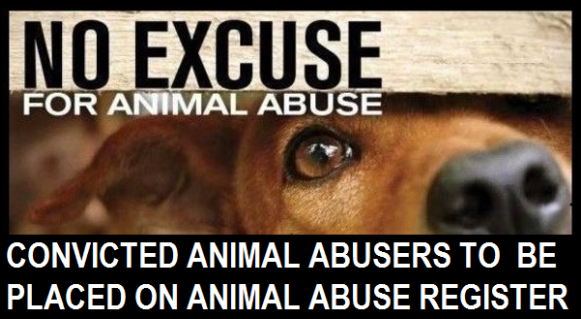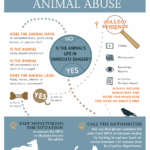In this age of heightened awareness regarding animal rights, one might casually wonder: why can’t animal abusers be charged as felons? This seemingly straightforward query opens up a labyrinth of legal, social, and ethical considerations that warrant thorough exploration. Despite the growing movement advocating for stricter animal welfare laws, the current legal framework often falls short when it comes to adequately punishing those who perpetrate acts of cruelty against animals. The juxtaposition of moral outrage and legal leniency in such cases raises an intriguing and challenging discussion regarding the efficacy of existing statutes.
To understand this issue, it is essential to establish the nature of animal cruelty laws across various jurisdictions. In many states within the United States, laws pertaining to animal cruelty can vary dramatically. While felonies exist for severe cases, such instances are often relegated to a lower classification, such as misdemeanors. This disparity frequently leads to penalties that do not correspond with the societal view of the severity of the crime itself. In other words, what people perceive as appalling may not escalate to the legal threshold required for felony charges.
One important factor influencing this discrepancy is the historical context regarding animal welfare laws. Traditionally, animals have been viewed as property rather than sentient beings, a classification that significantly diminishes the legal repercussions for mistreatment. Because animals are often treated as commodities or possessions, the legal ramifications for causing them harm align more closely with damage to property than with the violation of rights extended to sentient creatures. This antiquated perspective is slowly shifting, thanks in part to outward societal pressures, but the inertia of legal frameworks can be formidable.
The emotional impact of animal abuse cannot be overstated. Society’s collective response to heinous acts—such as those depicted in distressing news stories about hoarding, neglect, or torture—signals a critical need for punitive measures that reflect the severity of these acts. It poses a conundrum: are we truly committed to protecting animals, or do we merely pay lip service to their rights? If our empathy extends to a mere verbal acknowledgment without commensurate legal reform, we risk perpetuating an ineffective framework that allows abusers to escape the significant consequences warranted by their actions.
Moreover, consider the psychological profile of an individual who commits acts of animal cruelty. Research has attempted to uncover the motivations behind such cruel behaviors, often linking them to deeper psychological disturbances. Some suggest that animal abuse can be a precursor to other forms of violence, including domestic violence and criminal behavior against humans. If this is the case, why are the penalties not more stringent? Why are we not recognizing animal cruelty as a harbinger of broader societal issues? This lack of recognition reveals an illogical gap in our legal system that demands attention.
Public opinion plays a crucial role in shaping legislation. When a community rallies around a cause, it can exert a pressure that catalyzes legislative change. The relatively sporadic media coverage of animal cruelty cases may contribute to the inconsistent application of animal welfare laws. For instance, some high-profile cases have galvanized public outrage and prompted significant legal reforms, while less-publicized incidences often fall through the cracks. This inconsistency highlights the necessity for a systemic overhaul in how we approach the legislative aspects of animal rights. Would a national registry for convicted animal abusers, akin to sexual offender registries, hold potential for broader deterrence and accountability?
The argument for treating animal abuse as a felony must also contend with the broader implications it would have on legal resources and public perception. There exists a fear that labeling animal abusers as felons could overwhelm the criminal justice system, potentially diverting resources from other pressing issues. Yet, by the same token, failing to impose appropriate consequences on abusers perpetuates the cycle of abuse and diminishes society’s moral compass. The challenge lies in balancing the need for justice for animals with practical considerations of legal resource allocation.
Furthermore, legislative entities may often prioritize crimes directly affecting human beings, leading to the perception that animal cruelty is a secondary concern. This prioritization is exacerbated by the pervasive societal tendency to view the suffering of animals as less significant compared to human issues. Such a perspective neglects the intrinsic value of animal lives and their right to exist free from suffering. The task at hand is to shift this paradigm, engendering a collective reassessment of how we value all sentient life.
As we delve deeper into this complex issue, it becomes clear that charging animal abusers as felons is not merely a matter of reforming statutes; it necessitates a profound cultural shift. Advocates for animal rights must continue to engage in dialogues that merge legal advocacy, public education, and grassroots organizing. By doing so, we can pave the way for an enlightened approach to animal welfare that embraces a holistic understanding of the interconnections between our treatment of animals and the kind of society we aspire to be.
In conclusion, while the question of why animal abusers cannot be charged as felons may appear simplistic, it entwines itself with multifaceted realities that ultimately mirror our moral imperatives. Meaningful change will arise not from sporadic outrage but from sustained advocacy and reform. Only by addressing these underlying issues can we hope to foster a legal system that actively defends the rights of animals and provides justice for those who cannot speak for themselves.








